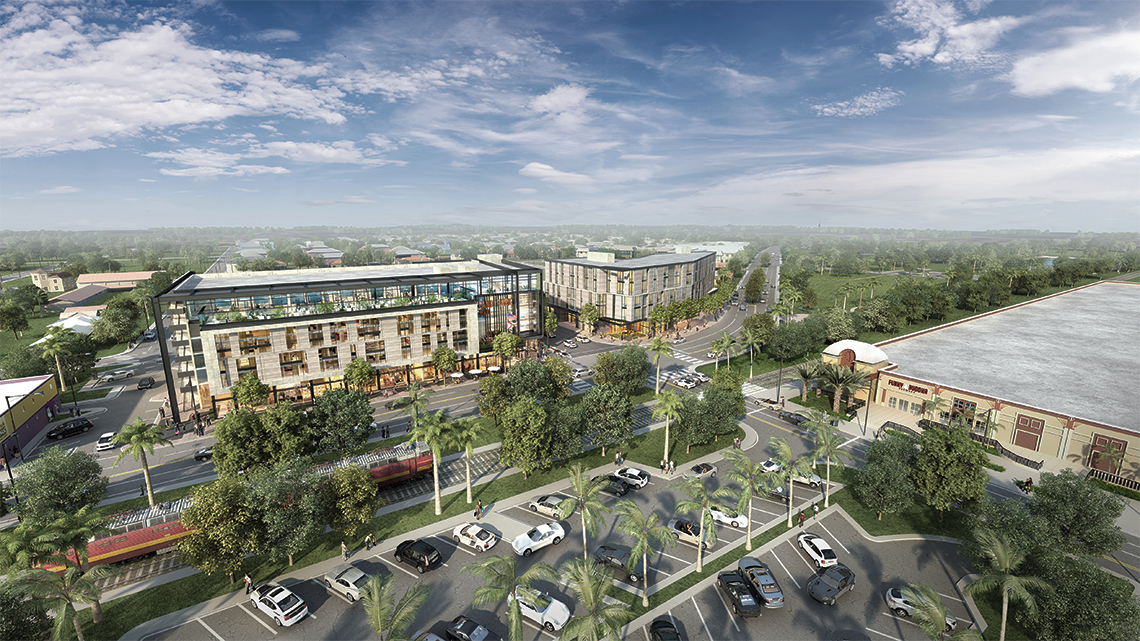The government of Oakland Park is set to become the anchor tenant in a commercial and residential complex the city is planning together with a private developer.
Oakland Park’s City Hall would occupy a mixed-use complex that would rise on two equestrian-looking lots ringed with white rail fencing. The city-owned lots hug 38th Street at Dixie Highway. Their location is across Dixie from the popular Funky Buddha brewery and restaurant and the current city hall, an aging olive-colored structure that opened as something else more than a half century ago.
The new development would include two six-story buildings with a mix of offices, residential units, and spaces for retailers and restaurants. Miami-based Integra Investments, Oakland Park’s preferred private developer, has proposed a complex with 30,998 square feet of office space for a new city hall location, plus 32,537 square feet of space for retail stores and restaurants, parking spaces for 343 vehicles and 101 residential units.
“The residential and commercial, mixed-use component is exactly what we think will help spur the sustainability of our downtown,” Oakland Park city manager David Hebert says, citing high expectations for the residential units.
“Funky Buddha has been an anchor of our downtown, and this development is literally across the street from that location,” he says, “and I believe there are a lot of people who would be intrigued at the prospect of living near or right across the street from one of their favorite local hangouts.”
The new development’s location, just west of the FEC railroad tracks that parallel Dixie Highway, called for an “industrial kind of aesthetic” in the development’s design, says Bernard Zyscovich. His Miami-based firm, Zyscovich Architects, designed the project’s two buildings and its public spaces for Integra Investments. “The railroad tracks really separate the east [side of the city] and the west, and what we’re trying to do is invigorate both sides,” Zyscovich says. “It needed some spark.”
Other than Funky Buddha, few restaurants are in the immediate area surrounding the site of the planned development on Dixie Highway. But “we think this could turn into a culinary district like the city manager would love to see,” he says. “We think it’s quite viable, and that a lot of the uses [of the planned development] are going to end up being entertainment and food-and-beverage uses.”
The city acquired the two vacant lots more than a decade ago. The idea was to foster denser development in a southeast section of the city that passes for a downtown. But this initiative lost momentum after the financial crisis, housing crash and stock market meltdown of 2008. “Unfortunately, due in large part to the economic challenges that we faced, it had some starts and stops over time,” Hebert says.
Hebert says the post-recession wave of real estate development in South Florida has bypassed Oakland Park. “We have, I think in many ways, been sort of a forgotten-about city,” he says. “We don’t have any new construction here to speak of.” And new construction is exactly what Oakland Park leaders want. It usually means increased public revenue from property tax collections, especially when property previously exempt from tax is developed.
Consider the current city hall, for example. It is more than 50 years old and proved useless in the days immediately after Hurricane Irma. During Oakland Park’s initial recovery from the hurricane, the city hall was closed because it had no power and no telephone or internet service. “We lost connectivity here,” Hebert says from his city hall office. “It was not built as a city hall initially. It needs significant repair and maintenance work, which would be costly.”
The new city hall location also would have greater resilience to hurricanes and would allow Oakland Park to consolidate its administrative functions in one location. Municipal staff now are divided between the current location and another building farther north on Dixie.
The planned complex on the two city-owned lots at 37th Street and Dixie Highway would turn them into taxable parcels, and it might do the same for the current city hall location, located on a four-acre block that could become a taxable parcel if privately redeveloped. Hebert says it is “larger and probably more valuable” than the two-lot site of the planned development on Dixie Highway, which spans about two acres.
The city manager also says Oakland Park is looking to buy Omega Church, a tax-exempt property near the current city hall building – a deal that could allow the city to combine both properties as a sizable assembled site for future private development. “One of our prime motivations is to try to spur economic development in the downtown,” Hebert says.
The new development remains a long way from being built. Recently, the city was negotiating a detailed agreement with Integra Investments to construct the complex, estimated to cost as much as $50 million. The development agreement would cover details ranging from Integra’s compensation to the number of parking spaces dedicated to city hall.
Another element of the development agreement that is subject to negotiation is the need to clean contamination at one of the two city-owned lots at 37th and Dixie. Evidence of contamination has been detected at the lot north of 37th Street due to leakage from underground gasoline storage tanks there.
Oakland Park has tried to obtain a “brownfield” designation for the lot, which would provide public funding for a cleanup. But the city fell short of its goal of obtaining the designation prior to selecting Integra Investments as the preferred developer.
Hebert says the development of the north lot “is still feasible. There are options that are available … and ultimately, that will be one of the elements of our negotiation” of a development agreement with Integra. “Cleanup is an option. Capping is an option. We are certainly going to be ensuring that that is achieved, whatever the outcome as this agreement moves forward.”
In any case, construction of a new home for Oakland Park City Hall and the rest of the planned complex is unlikely to be finished before 2020. “I’d like to do it sooner rather than later,” Hebert says. “But I’m sure it’s two to three years away.”














3 comments
Nobody wants to live or work 50 feet from railroad tracks
Great idea regarding City Hall. Yo Homer, The current City Hall is right now 50 feet from the railroad tracks…….I do hope however the OP doesn’t get drunk on “possibilities”. OP, Keep it simple stupid.
It’s also time to “86” the Dapur guy trying to open up a restaurant In a space that he’s been “building” for at least 12 months.. Time to MoveOn from a failed attempt. Let’s think of the neighborhood residents and the potential of a possible culinary district destination.
This is very exciting news! Downtown Oakland park is a beautiful little area, but it can definitely be redeveloped. The new plans and renderings looks like a step in the right direction. I can’t wait to see it all come to life.